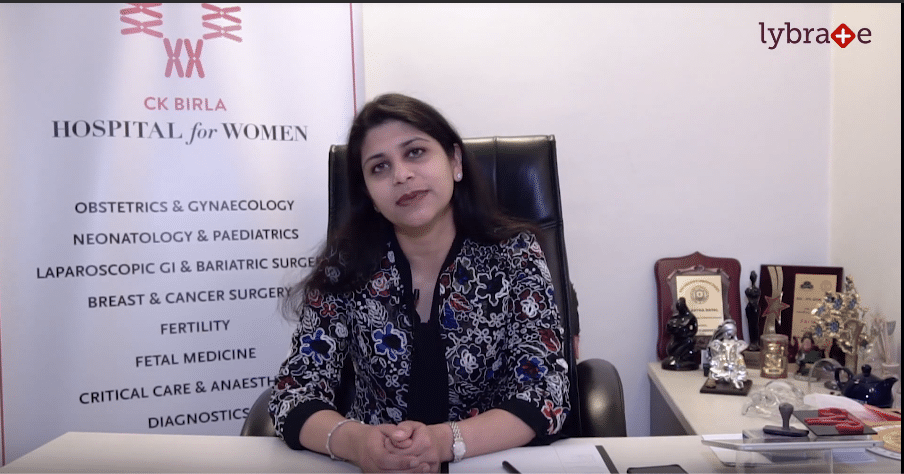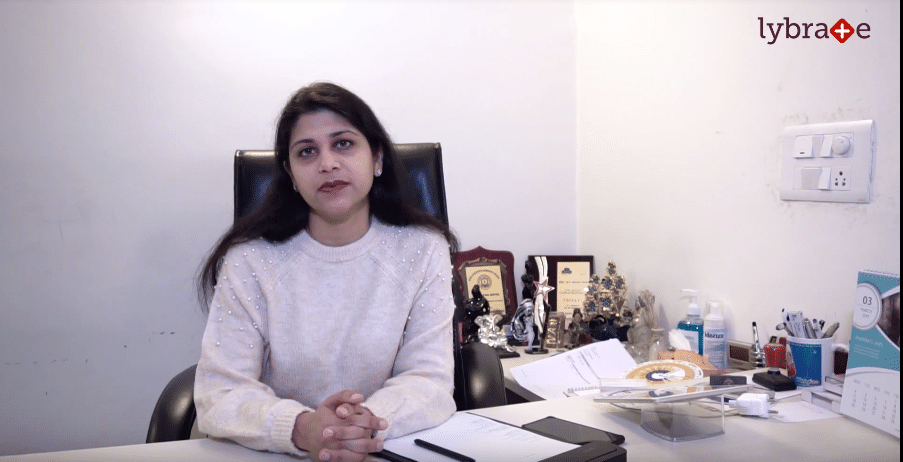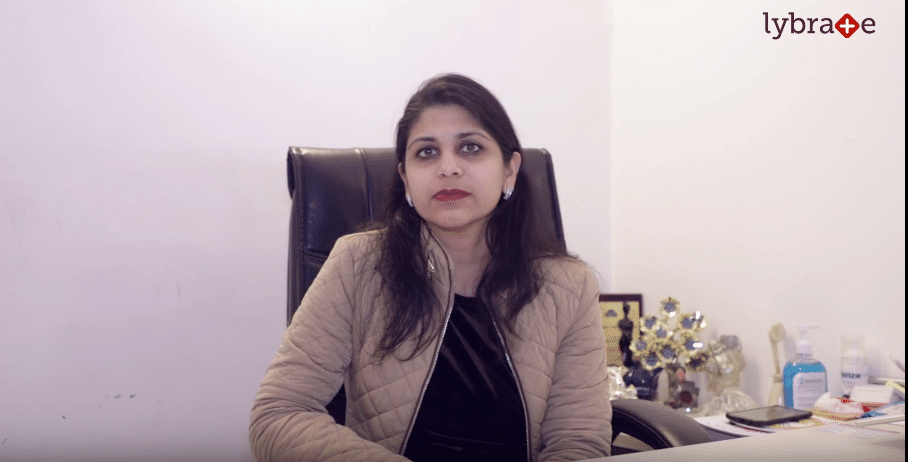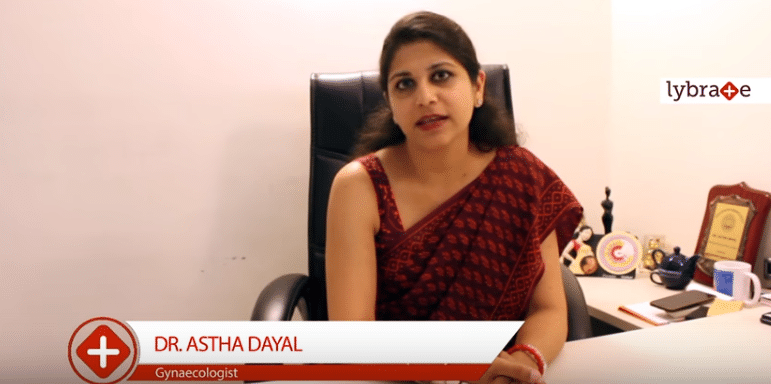

CK Birla Hospital
Gynaecologist Clinic
About Clinic
Customer service is provided by a highly trained, professional staff who look after your comfort and care and are considerate of your time. Their focus is you....read more
Clinic Timing
Clinic Location
Clinic Images
Videos

Hi,
I am Dr. Astha Dayal, Gynaecologist. Today I will talk about the ways to relieve pain in labor. For women, pregnancy is really a special time, people really look forward to it and its time for celebration. But every woman has fear in the heart and that is labor pain. And sometimes people do not want to talk about it. They do not want to scare themselves. I think it is important to know what are the options available to get relief from pain than taking an informed decision. And a lot of studies have shown that if you are not stressed in labor, the oxytocin releases better, faster labor, less pain and then smooth delivery. So, it is important that you do not fear labor and you understand that what options are, what level of pain relief can be given and then not be scared about it. So, starting from the initial stages of labor. The first stage of labor people has a very prolonged first stage.
A little pain will be happening after 1 hour or 15 mins but it is a tolerable pain. Some people prefer to stay at home at that time. You can walk around, watch TV, chat with a friend. You can also do some breathing exercises which helps you relax better, that will help you to take the contraction in a better way. When the pain increases, you would like to get yourself a massage. So, you should have one designated person who should be there with you in labor. A birthing partner can help you throughout your labor. All things should be planned in advance. So, we recommend you for a birth plan. How will you plan your labor? Do you want to have a hot shower, any aromas in the room, do you want dim lights, who you want to be with you as your birthing partner, pain relief methods, so if you have all this sorted, it is easier for you to manage at that particular time. You can take a lot of birthing positions, you can sit on a ball, you can lean on a chair, you can move around, walk around, any position you are comfortable in. This will all give you some pain relief during that movement of contraction.
Now, as the contraction increase, sometimes it becomes little unbearable at that particular time you can opt for gas and air. This is available very freely in hospitals. It is a supply of gas in the room, it is given through a mask. So, it is a patient control method. The moment you start getting a contraction, you take it and breath in it. The moment contraction goes, you can remove it. So, this is the gas which makes you little drowsy, relaxed, helps in pain relief to a little extent and then when you breathe out it goes. It is very safe for the baby also. Half of my patients do not need any other pain relief method, they live with the help of this gas only. Sometimes, some women do not like it and they feel like they are not getting much pain relief, so you can go to the next level which is called epidural anesthesia. With the help of this, medicine is being injected into your back. It is not painful. In this, your lower body part will become a little numb. You will feel the contraction, tightening, but you will not feel pain. This is the most effective form of pain relief. It actually relaxes you. The only side-effect for this injection that you will face difficulty to push the baby. So, sometimes we need to pull out the baby with the help of the vacuum. It doesn't cause any epidural backache which is the usual myth and comfortable thing to deliver.
For those people who are opting for c-section just because they are scared of the labor pain, an epidural is a very good thing. You will be pain-free during labor. And if can have a normal delivery, it is much better than c-section. Just because of fear of pain, you should not go for surgery. Another method for pain relief is water birthing. This is being used the world over. In North India, we have very few centers for this kind of birth. We pace the mother in water for which we have access for temperature control. There are sterile lining. It is there in a labor room. A woman can sit in the water and move also. If you notice that if you do exercise, you get tired faster. In water also, you swim and burn calories and you get less tired. The pain relief is also much better. The contraction is taken in a better way. The woman is more relaxed. WHole birthing experience is a smooth experience.
The baby becomes used to live in water, baby just swims out into the tub. We hand over the baby to the mother and mother can start feeding the baby immediately. No internal checks we do. Woman just breath out the baby. It is a relaxing and very beautiful experience. But a lot of criteria that you have to fulfill if you want to go for a water birth. You should not gain too much weight for active labor and there should not be any complications which require continuous monitoring of the baby's heart. The women who are having water birth are very happy with their experience. So, in nutshell, I would like to say every woman who is going for labor, should have a plan in her mind that what all methods are available she wants to use in her labor and what all things she doesn't want. I am wishing all of you a very healthy and happy journey through pregnancy in motherhood. So, the intent is basically a healthy baby and mother. Whatever pain relief you take, you should not think not bearing pain will make you a less strong woman in any way. There are these options available which women should freely use.
Thank You!

Hi,
I am Dr. Astha Dayal, Gynaecologist. Today we are going to talk about cervical cancer vaccine. This is the topic I picked because there are a lot of myths around it and not many people in India know about it. Cervical cancer is the cancer of the mouth of the uterus. It is the 2nd most common cancer in women, India after breast cancer. If you want to know the statistics, every 8 minutes a woman in India is diagnosed with cervical cancer. Now, this is only cancer in the world which has a vaccine because this cancer is caused by a virus. And the virus is human papillomavirus or HPV and it is sexually transmitted. So, this is the most effective vaccine if a woman takes before her first intercourse. And after the introduction of the vaccine, it is being used universally and that is the reason the cancer rate has really got down. Because in India it is a little expensive. People who can afford must take the vaccine. A cervical cancer vaccine is of 2 types. One prevents cancer and another prevents HPV. Most of the time your body has the capacity to fight the virus.
So, if we check and see that a person has HPV that does not mean the person has cancer because if we see after 6 months, your body will remove the virus itself. So, if anyone has HPV in the body, we have to check after 6 months to check if the patient has persistent HPV. Now, the good age for the vaccine is 11-15 years. If we get it before 15 years, you need 2 doses at the difference of 6 months. And if you take after 15 years of age, you need 3 doses over a period of 6 months. It is 100% protective if a woman is not sexually active and it is 70-80% effective if you are sexually active. Now, what are the side-effects? Everybody is scared of this vaccine because of some initial report of people having some reaction. But nothing serious has been reported. There will be a little pain, burning, redness or fever at the injection side which happens after every vaccine. The only precaution you need to take over a period of 6 months that you do not have to get pregnant.
We give this vaccine up to the age of 35-40. As young you are and taking the vaccine, the results would be more effective. In abroad, there is a vaccine which covers 9 types of the virus but the cancer protective types are the same. The advantage of this cancer is that it is slow growing cancer. If the initial stage is an infection than after 15-20 years, it will become cancer. If you see changes in yourself, you can get treatment to cure at that particular time. Because we have 10-15 years of the window. So, if a person has missed the vaccine, then there is another way with which you can prevent cervical cancer which is paps smear. And nowadays we do paps smear along with HPV testing. If a woman is less than 30 years and she is sexually active, she should get a paps smear done every 3 years. And if she is more than 30 years, she should get the paps smear done along with HPV test every 5 years.
These are the tests for the screening of cervical cancer. These are not an invasive test like we do gynaec or an internal examination, just at that point of time we take a small brush from the mouth of the uterus. It is not painful but uncomfortable and it is a 2-second thing and that is to be done at every 3-5 years. It will protect you from cancer. So, either a woman should get the vaccine at an appropriate age or the tests need to be done time because this is a highly preventable cancer.
Thank You!

Hello everyone,
I am Dr. Astha Dayal and I am a gynaecologist. So today I am gonna discuss about vaginal discharge. So actually a lot of young woman who come with vaginal discharge or UTI but sabse phle everyone should know that there is some discharge which is a normal discharge. So, in a normal menstrual cycle the first first week after your periods there is hardly any discharge. Then in the middle of the cycle which is between the 10th to the 20th day, there is a lot watery colourless discharge which can happen and in the last week before your period there is a thick white whitish discharge. So this is the normal cycle of the vaginal discharge and if it is not troubling you, if it is not causing any irritation or smell, then you don't really need to treat it.
However, if there is a foul smell or there is any burning or pain or itching or if it is causing other symptoms like painful urination, painful intercourse then you must visit your doctor and get it checked. So there are a little there are different kinds of discharge. So, the most common one that we come across is candidal discharge which is a fungal infection. Now a lot of reasons can cause this discharge especially in moisture or if you have a family history of diabetes or you eat a lot of sweets or if you recently had a course of antibiotics. So this fungal infection can cause a curdy white discharge which causes itching. This can even happen to girls who are not sexually active and this needs some examination by doctor and needs an antifungal treatment. So we need to give you some oral antifungals and some local pessary as well.
Similarly there are some kinds of discharges which are bacterial infections like a greenish discharge or a yellowish discharge or a foul smelling discharge. So these discharges usually happen in someone sexually active and may be if you are not using protection then you will have a higher chance of having such an infection. This is a little risky because this infection can travel to the through the cervix it will go into the uterus, it can go into the ovaries, tubes and it can cause a PID or a pelvic inflammatory disease. So it is important that if you have any abnormal discharge you must visit your doctor and you need to treat it and we generally over treat such a discharge because we give you a long course of antibiotics so that this infection does not spread to the abdomen; specially when you are young, in your 20s you are more likely to cause to get such a such an infection and it is important to treat it totally so that it does not spread to the pelvis.
Also I get a lot of girls who complain of UTI. Now UTI and a vaginal infection are two different things. UTI means a urine infection. It can happen if you use washrooms which are dirty, it can even happen after intercourse and that really needs a urine examination. So we need to do a urine routine and culture to check whether there is actual infection in the urine and usme the symptoms jo apko honge you'll feel like you have to go to the washroom again and again, you'll feel a little pain towards the end of passing urine, you feel little feverish, you feel little chill and shivering, you will feel a little nausea and these are symptoms of urine infection.
This can this also needs antibiotics and you need to have a lot of fluids and more and a proper treatment according to the culture with a full course of antibiotics you should do. Now the problem with these UTIs and vaginal infection are they are recurrent. Ye bar bar bar bar bar bar hoti hai. So it is important that you maintain some particular hygiene jaise washroom jabhi bhi aap use karenge must make sure that you not have a little contact, you are avoiding a dirty washroom. Also for the discharge, you have to be careful that you are keeping the area dry. You always clean from front to back, you keep the area you wear loose cotton underclothes, you also are able to you avoid synthetic undergarments and tight lowers which can cause a little sweaty and avoid a lot of sweets or sugary things. Also a very important thing is you should always use barrier contraception, you should avoid a lot of scented products in that area, these perfumes and douches and all they are very they could be harmful to the delicate mucosa in that area. So if you have if you take care about all these things the frequency of these infections is much much less. So, I think that is all we gonna talk about today.
Thank you.

Here are benefits of Preventive Screening
Hi I’m doctor Asthta Dayal and I’m a consultant gynecologist. And I practice in Gurgaon. I have completed my graduation and post-graduation from Maulana Azad Medical College and I have done my MRCOG from London. I have practiced in hospitals like MediCity and Artemis and now I’m privately practicing in Gurgaon so I would like to discuss about preventive screening. Unfortunately preventive screening is something that is highly ignored by women in India and in fact the only time when a woman visits the gynecologist is when she’s actually pregnant now the kind of diseases that we’re having these days like PCOD, thyroid cancers. It is very important that we detect them at an early stage and treat them and unfortunately they don’t produce any symptoms still at very late stage. So that is why a preventive screening is the need of the hour.
So all women should get an annual preventive health check from a gynecologist. Now what happens in the gynea-check that when you count all the gynecologist, we first take your history in which try illicit factors which will put out a higher-than-usual risk of getting a certain disease like PCOD or cancer if you have a family history and then we go on to an examination which includes a breast examination. You can actually learn the examination from your gynecologist which you should be doing yourself once every month and now. This is important because breast cancer is the most common cancer in women in cities in India and India we have a 50-percent of vitality of breast cancer and main reason for this is because it is detected a very late stage.
So this besides the self-examination we mentioned also go for mammography once every other year, once there is about the age of 40. Besides this we also do an abdominal examination and an internal gynea examination. Now an internal check is something which women really are apprehensive about and that’s the reason they don’t want to visit a gynecologist but believe me it’s not painful. At the most it is a little uncomfortable or a little weird and it does not even take a minute during the internal check. We take you for any infection, sexually transmitted diseases, any cervical polyps and any conditions of the uterus like a fibroid or ovarian cyst and you can also take a pap tests at the same time. Now what is a pap smear? Pap Smear is a test which in which we just take cells from the mouth of the uterus, which is the cervix and we send it for testing. It is a screening test for cervical cancer which actually detects the cancer 15 years before the cancer develops.
Now cervical cancer is the second most important cancer in women in India. In fact, one woman is dying every eight minutes because of cervical cancer in India and this is such a distressing statistic because this cancer is highly preventable and treatable in fact there is a vaccine for cervical cancer. Vaccine which can be given to women in the age group of 19 to 27 and this actually prevents the occurrence of cancer. It is given routinely in US and UK in schools but in India we are highly unaware about it. So it is a good practice to get your routine screening for the PAP smear once every three years and an ultrasound annually to detect problems like PCOD and thyroid and other fibroids and so I would highly recommend that women do get an annual health check. And because the health of the woman and reflect only health the family.
So in case you want to get in touch with me you can do that through the Lybrate through a chat or a call or you would consult me in my clinic in Gurgaon.
Doctor in CK Birla Hospital
Doctor in CK Birla Hospital

Dr. Astha Dayal
Patient Review Highlights
Very helpful
12 reviewsknowledgeable
6 reviewsProfessional
2 reviewsWell-reasoned
1 reviewsSensible
2 reviewsPrompt
3 reviewsCaring
1 reviews